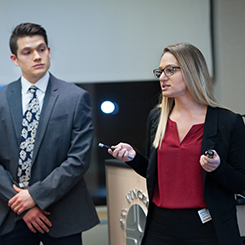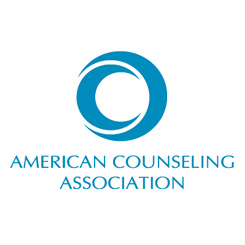

As a mental health counselor, you’ll help individuals, groups, and families overcome challenges by providing them emotional and psychological support and assist them in improving their well-being.
As part of our innovative M.A. program in clinical mental health counseling, you'll study theories and skills related to mental health, substance use, and trauma interventions and learn how to apply them to connect with individuals and groups from diverse backgrounds.
Our 60-credit program is designed to meet the program requirements to be a Connecticut Licensed Professional Counselor (LPC). You will gain extensive fieldwork experience through counseling practicum opportunities and internships that match your interests and professional goals while developing the skills and knowledge to enhance and enrich individuals, families, groups and communities.
As part of our program, you can also supplement your education with the unique opportunity to pursue a concentration in forensic mental health or community development.
The Clinical Mental Health Counseling (CMHC) Program at the University of New Haven prepares students to be effective and competent counselors in a dynamic profession. A central foundation of the CMHC Program mission is to prepare counselors to work in an increasingly diverse society and a broad range of practice settings. This includes an emphasis on developing the skills, knowledge, and awareness necessary to work with individuals from diverse backgrounds and requires an understanding and integration of principles of advocacy and social justice. Furthermore, the program emphasizes the integration of ethical and legal principles as well as the development of professional leadership skills. Steeped in the University of New Haven mission and tradition, the CMHC program motivates and transforms students to embrace the value of high-impact, collaborative, and discovery-based learning.
The information below is designed to show the many possible careers you could pursue with your major. The research is provided by Encoura, the leading research and advisory firm focused exclusively on higher education. It includes median national salaries and industry growth projections over the next decade. Click here to view the full report.
Director of Public Safety Programs
8% Growth 2021-2030
Disaster Prep Specialist
8% Growth 2021-2030
EMS System Coordinator
8% Growth 2021-2030
The University of New Haven offers a wide variety of in-depth courses that create a transformational educational experience for our students. To view the complete list of courses you'll take while pursuing a M.A. in Clinical Mental Health Counseling, check out the Academic Catalog:
Concentrations:
Clinical Mental Health Counseling, M.A. - General Concentration
Clinical Mental Health Counseling, M.A. - Community Development Concentration
Clinical Mental Health Counseling, M.A. - Forensic Mental Health Concentration
Earn your degree from the convenience of home with our new 100% online Master of Arts in Clinical Mental Health Counseling program.
Learn MoreDiverse methods of instruction utilized in the program include, but are not limited to, classroom lectures, didactic instruction, role-playing and simulation, supervised practicum and internships, group class discussions and case studies, experiential learning activities, research and literature review, supervision and feedback, and professional development workshops.
Applicants to the Clinical Mental Health Counseling Program must hold a bachelor's degree from a regionally accredited college or university (or the international equivalent).
Get an inside look at what differentiates the University of New Haven and how your experiences as a student will prepare you for success.



Our faculty are leaders and innovators in their fields, bringing both deep professional experience and academic rigor to the classroom.
All University of New Haven students have access to the many resources available through the University’s Career Development Center, which has been named one of the best in the nation by The Princeton Review.
From career assessments, networking, and job shadowing to on-campus interviews and salary negotiation, the Career Development Center provides the skills and connections to identify a meaningful career and an opportunity to pursue your passion.
Learn More
The Charger Blog
Briona Grant ’20 M.A., a graduate residence director for Bethel Hall and candidate in the University’s master’s degree program in clinical mental health counseling, was one of several students who was recently honored at an awards ceremony for demonstrating leadership, promoting diversity, and for being a “fully charged” member of the campus community.
Enjoy the latest issue of the CMHC Buzz, the official newsletter of the University's master's degree program in Clinical Mental Health Counseling.
View the University of New Haven CMHC Annual Report for the academic year 2022-2023.
CMHC Annual ReportAn advanced degree from the University of New Haven will help you take your career to the next level. Each program offers convenient scheduling, personalized attention, and state-of-the-art facilities.
The following are required when applying for the M.A. in Clinical Mental Health Counseling:
Admission is highly competitive and application reviews are conducted once a year for fall semester admission. The application deadline is February 1st.
Selected applicants will be interviewed by department faculty to assess academic readiness, professional maturity, interpersonal skills, and alignment with counseling profession values. Diversity and commitment to serving diverse populations are prioritized in admissions. Program faculty then select who will matriculate into the program.
View Graduate Application RequirementsThe University of New Haven Graduate School is an excellent value with reasonable tuition. Of course, you will still have bills to pay and the Financial Aid office can help.
Learn More
Please note that we are currently working through the states’ requirements and will update this information as we make the determinations. Please click the link below to find state-specific contact information for Licensed Professional Counselor Regulatory Departments and Boards.
Click the link below for contact information on State licensure boards.
Click here for more information on Licensure & Professional Certification Disclosures.